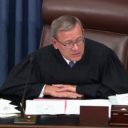
The Supreme Court Justices have accepted two cases that have produced an opposition of results in lower courts regarding the contraceptive mandate law. One was brought by the owners of Hobby Lobby, David Green, due to his biblical principles.
The full U.S Court of Appeals for the 10th Circuit in Denver said forcing the company to comply with the contraceptive mandate would violate the Religious Freedom Restoration Act.
The fight over implementing certain parts of the problematic healthcare reform law will be over the controversy of involving coverage for contraceptives and religious liberty.
Certain issues are whether private and non-profits companies are allowed to refuse the “law” because it violates their religious beliefs.
Approximately over 100 pending lawsuits have been filed in federal court challenging the birth control coverage benefits in the Affordable Care Act law that have been repeatedly championed by President Obama.
Just two years prior, “ObamaCare” skimmed on by with a close call regarding the key funding provisions within the Affordable Care Act. The key funding provision ruled most Americans would be required to buy insurance or pay a financial penalty.
The same individual mandate that the Democratic Party would like to push back due to 2014 elections.
Now, the constitutional debate shifts to the separate employer mandates — whether corporations and religious institutions themselves are entitled to the same First Amendment rights as individuals.
Prior to this, two appeal courts have upheld the contraceptive mandate and three federal appeals courts have struck it down — giving the Supreme Court Justices no other alternative but to hear these cases.
Within a divided opinion, the court relied in part on the Supreme Court’s decision in Citizens United v. Federal Election Commission, ruling that corporations had political speech rights just as individuals do.
Judge Timothy Tymkovich stated: “We see no reason the Supreme Court would recognize constitutional protection for a corporation’s political expression but not its religious expression.”
A divided panel of the U.S Court of Appeals for the 3rd Circuit in Philadelphia ruled that a Pennsylvania cabinet-making company owned by a Mennonite family must comply with the contraceptive mandate.
That decision noted the 10th Circuit’s opinion, but said there was a “total absence of caselaw” to support the argument that corporations are protected by the guarantee of free exercise of religion.
Judge Robert E. Cowen wrote: “Even if we were to disregard the lack of historical recognition of the right, we simply cannot understand how a for-profit, secular corporation apart from its owners can exercise religion.”
The religious freedom act prohibits the federal government from imposing a “substantial burden” on a person’s exercise of religion unless there is a “compelling governmental interest” and the measure is the least restrictive method of achieving the interest.
If Hobby Lobby finds a way around this contraceptive mandate “law” they will evade the $1.3million a day hit, which is the penalty for not funding said mandate.
David Green and his family are the owners of Hobby Lobby Inc., they are Christians, and know that parts of the mandate “law” goes against Christianity’s law.
As Christians it is their duty to God to oppose the contraceptive mandate — they say some of the drugs that would be provided prevent human embryos from being implanted in a woman’s womb could be equated to an abortion.
The privately held company does not object to funding other forms such as condoms and diaphragms.
The Obama administration has been defending the law and federal officials say they have already created rules exempting certain nonprofits and religiously affiliated organizations from the contraceptives requirements. However, leaving companies such as Hobby Lobby Inc. subjected to such implementations of the law.
If one forces the corporation to implement a law that goes against their beliefs is that not a violation of the Religious Freedom Restoration Act?
A key issue will be interpreting the 1993 federal law known as the Religious Freedom Restoration Act. The question that will come into play is how to address companies, churches, and universities, are they to be included, or do the protections apply only to individuals?






